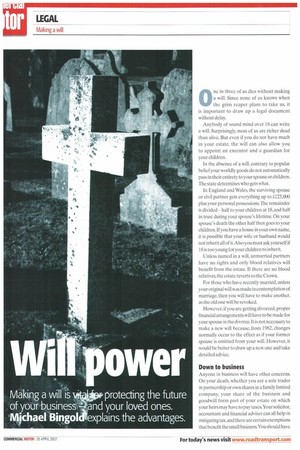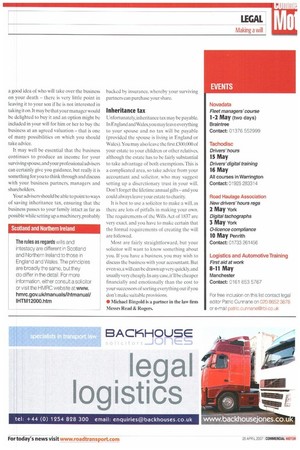Vaking a will is protecting the future of your business and your loved ones. 'Mjchael Bingoldrexplains the advantages.
Page 34

Page 35

If you've noticed an error in this article please click here to report it so we can fix it.
0 ne in three of us dies without making a will. Since none of us knows when the grim reaper plans to take us, it is important to draw up a legal document without delay.
Anybody of sound mind over 18 can write a will. Surprisingly, most of us are richer dead than alive. But even if you do not have much in your estate, the will can also allow you to appoint an executor and a guardian for your children.
In the absence of a will, contrary to popular belief your worldly goods do not automatically pass in their entirety to your spouse or children. The state determines who gets what.
In England and Wales, the surviving spouse or civil partner gets everything up to £125,000 plus your personal possessions. The remainder is divided — half to your children at 18, and half in trust during your spouse's lifetime. On your spouse's death the other half then goes to your children. If you have a house in your own name, it is possible that your wife or husband would not inherit all of it.Also you must ask yourself if 18 is too young for your children to inherit.
Unless named in a will, unmarried partners have no rights and only blood relatives will benefit from the estate. If there are no blood relatives, the estate reverts to the Crown.
For those who have recently married, unless your original will was made in contemplation of marriage, then you will have to make another, as the old one will be revoked.
However, if you are getting divorced, proper financial arrangements will have to he made for your spouse in the divorce. It is not necessary to make a new will because, from 1982, changes normally occur to the effect as if your former spouse is omitted from your will. However, it would be better to draw up a new one and take detailed advice.
Down to business Anyone in business will have other concerns. On your death, whether you are a sole trader in partnership or own shares in a family limited company, your share of the business and goodwill form part of your estate on which your heirs may have to pay taxes.Your solicitor, accountant and financial adviser can all help in mitigating tax, and there are certain exemptions that benefit the small business. You should have a good idea of who will take over the business on your death — there is very little point in leaving it to your son if he is not interested in taking it on. It may be that your manager would be delighted to buy it and an option might be included in your will for him or her to buy the business at an agreed valuation — that is one of many possibilities on which you should take advice.
It may well be essential that the business continues to produce an income for your surviving spouse, and your professional advisers can certainly give you guidance, but really it is something for you to think through and discuss with your business partners, managers and shareholders.
Your advisers should be able to point to ways of saving inheritance tax, ensuring that the business passes to your family intact as far as possible while setting up a machinery probably backed by insurance, whereby your surviving partners can purchase your share.
Inheritance tax Unfortunately, inheritance tax may be payable. In England and Wales,you may leave everything to your spouse and no tax will be payable (provided the spouse is living in England or Wales). You may also leave the first £300,000 of your estate to your children or other relatives, although the estate has to be fairly substantial to take advantage of both exemptions. This is a complicated area, so take advice from your accountant and solicitor, who may suggest setting up a discretionary trust in your will. Don't forget the lifetime annual gifts— and you could always leave your estate to charity It is best to use a solicitor to make a will, as there are lots of pitfalls in making your own. The requirements of the Wills Act of 1837 are very exact. and you have to make certain that the formal requirements of creating the will are followed.
Most are fairly straightforward, but your solicitor will want to know something about you. If you have a business, you may wish to discuss the business with your accountant. But even so, a will can be drawn up very quickly, and usually very cheaply. In any case, it'll be cheaper financially and emotionally than the cost to your successors of sorting everything out if you don't make suitable provisions.
• Michael Bingold is a partner in the law firm Messrs Read & Rogers.






















































































































































































